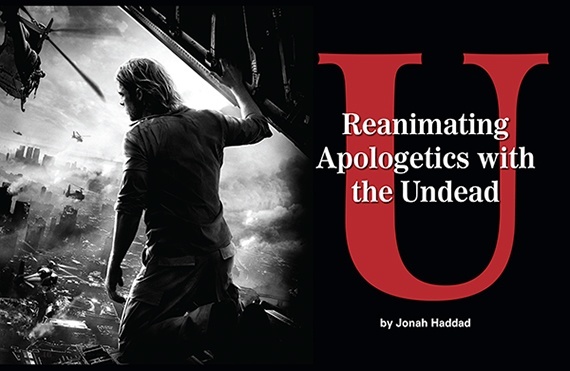This article first appeared in the CHRISTIAN RESEARCH JOURNAL, volume 37, number 01 (2014). The full text of this article in PDF format can be obtained by clicking here. For further information or to subscribe to the CHRISTIAN RESEARCH JOURNAL go to: http://www.equip.org/christian-research-journal/
Zombies are distasteful creatures. The odor of their rotting flesh precedes them as they stagger from the grave. In the dark they grope with cold bony hands, searching for victims to devour or to add to their decomposing numbers. We call them the living dead, because any semblance of human rationality or emotion has left them. They are nothing but a putrid horde of corpses marching relentlessly toward their prey or lurking in the shadows, waiting to unleash hell on anyone unfortunate enough to cross their path.
We are naturally repulsed by them, but in our repulsion there lies a strange attraction evidenced by the abounding zombie references in popular culture. Zombies have lurched and moaned their way into movie theaters, bookstores, and living rooms. They took over the world in last summer’s blockbuster World War Z. But they have also taken to comedy (Shaun of the Dead) and romance (Warm Bodies). They appear in video games (Resident Evil) and TV series (The Walking Dead), having even found their way into classic literature (Pride and Prejudice and Zombies).1 From George Romero’s nightmarish film, Night of the Living Dead, to Max Brooks’s practical and comedic book, The Zombie Survival Guide, zombies have left their mark on the imaginations of many.2
Our fascination with the undead may be attributed to how they speak to a deep-rooted fear—fear that we might somehow join the ranks of these mindless cadavers, and that the peaceful masses of humanity could turn, in the blink of an eye, into monsters capable of unimaginable atrocities. Zombies embody our anxieties about the violence and horror that lies within the hearts of all those people we meet on the streets, in the mall, or at the office. Zombies unsettle us because they are us: our friends, neighbors, and family members. They are fellow citizens ravaged by decay, morally catatonic, intellectually obfuscated. And herein lies their apologetic value.
The zombie condition resembles, in many ways, the fallen human condition. Fear and despair, violence and chaos—these words describe more than a zombie apocalypse; they are all found in the blackness of the human heart. Having bitten the Edenic fruit, Adam and his race were, in turn, bitten by a pervasive sin condition that infects the human heart and intellect to this day. Our bodies of death are accompanied by corrupt moral categories and intellectual confusion (Rom. 7:24). Unable to know God rightly, we are subsequently unable to know our world rightly. Though our flesh remains intact, we fallen human beings are little more than walking dead—spiritual zombies estranged from the life of God and separated from His eternal presence (Eph. 4:18). Scripture reminds us that apart from God’s saving grace, humans are spiritual corpses, dead in their transgressions and sins (Rom. 3:23–24; Eph. 2:1–2). It is a hopeless state that welcomes the wrath of God (Eph. 2:3).
The zombies of fiction are beyond a cure. This is what gives them such ghastly appeal as unstoppable objects of horror. Their mangled bodies incessantly crawl and bite their way toward the living. Humanity’s only hope of ending the assault of the undead is in a spray of bullets or a blow to the head. But the spiritual zombies that make up the human race enjoy a greater hope. The violent death merited by fallen humans has been suffered by the God of the universe so that the spiritual zombie “may have life, and have it to the full” (John 10:10).
EXPLOITING ZOMBIE POPULARITY
As a loathsome yet potent analogy for the human condition, the zombie is able to open the doors to thoughtful discussion. Furthermore this creature is unlikely to withdraw from movie theaters or bookstores anytime soon. With each successive zombie film or media reference comes an opportunity to point unbelievers to the God who can call us out of the spiritual grave and into spiritual life. Friends who have viewed a recent zombie film or read the latest zombie novel may be eager to discuss its implication on a deeper spiritual level.
There is tremendous apologetic value in simply posing the right questions: In what ways might human moral conduct break down into the mindless ruthlessness depicted in zombie films? How might humans (like zombies) lack moral control and the ability to change their ways? Does our fear of the undead reflect a deeper anxiety over disease and chaos in the streets? Why are we so uneasy with death and what comes after it? If the living dead have no possibility of revitalization, what chance, if any, do we have at new life, either now or in the hereafter? Probing questions will move our conversations from the world of fiction to the world of reality and allow us greater access to important metaphysical questions related to life, its meaning, and its origin. Such questions can point the unbeliever to Christ—the life-creator and victor over death (1 Cor. 15:54–57).
This diametric contrast between life and death summons further reflection. Zombies represent death and everything that goes with it. The reek, the decomposition, and the rigor mortis give them away at once. They embody death. But as noted above, this stands in sharp contrast to Jesus who is life itself (John 14:6). Life is inseparable from Jesus’ nature, and because of this, He has the authority to give life. Jesus said, “Whoever hears my word and believes him who sent me has eternal life and will not be condemned; he has crossed over from death to life” (John 5:24).3
Every reference to zombies in the media is an opportunity to ask our peers why we find these creatures so loathsome and fascinating at once. Every throng of zombies marching across the screen provides an opportunity to consider the masses of humanity that march around us, to pray for them, and to tell them the good news of life in Christ.
A REMINDER OF WHAT WE WERE
By understanding zombies as an analogy to the fallen human condition, Christians should likewise be reminded of their past without Christ. Those who have experienced life in Christ have only done so by the grace of God. This reality should evoke a healthy humility in the apologetic endeavor by reminding believers that they are no better and no more worthy of Christ than those around them. Christians must not forget what they once were: spiritual corpses, enemies of God (Rom. 5:10).
Followers of Christ still carry the scars of their former way of life. Some carry the pain of abandonment or abuse. Others struggle with guilt over past sins such as abortion, sexual promiscuity, hatred, or racism. But whatever their background, all Christians must endure a diversity of present struggles. Temptations toward anger, greed, lust, pride, and addiction wage their unrelenting assault. Christians will continue to battle the old zombie nature that longs to pull them back down into the grave. And while it is true that believers have been made alive—redeemed, washed, justified, and sanctified by the grace of God, through the work of the Lord Jesus Christ, and by the power of the Spirit (1 Cor. 6:11)— these same Christians are yet to enter a glorified state, away from the fallen world where old habits are hard to break.
Yet the struggles of sin and temptation must never serve as an excuse. Zombie-like behavior should never be permissible among believers and should have no place in our apologetic efforts. The ultimate goal of apologetics is not to maul people with words, nor to devour them with arrogance, but to defend the truth claims of biblical revelation. Each eerie moan that escapes the zombie’s rotten lips should serve as a reminder to all Christian apologists to recognize what we once were so we can respond in humility and gentleness to those around us. The world is rife with spiritually lost people. The church is rife with ex-spiritually lost people. Both are in desperate need of Christ.
THE END OF FEAR AND LOATHING
In the movies, zombies show no pity and feel no pain. Protagonists who find themselves face-to-face with them must either fight or flee. These marred and violent creatures are neither loveable nor redeemable. They want nothing more than to lash out violently against those who oppose them. They want nothing more than to devour the living. And much like the fictional zombie condition that engenders death and gore, the fallen human condition generates rebellion against the Lord of life and all good things that flow from Him.
We live in a world dominated by spiritual death, and those who serve the Lord should not be surprised to find themselves in conflict with the ideas and priorities of the world. In other words, the living can expect to be at odds with the dead. It should not surprise us that those who reject Christ will also reject Christians (John 15:20). This is perfectly normal to the point that if a Christian does not feel somewhat threatened by the culture of spiritual death around him, it might just be that he has been re-assimilated into the world of spiritual zombies. If we have learned anything from zombie films, we can be sure that a zombie will not attack and devour its own kind. Those who speak of God’s grace, who proclaim the gospel, who stand up for the innocent, who defend the life of the unborn, who live in sexual purity, and who respect the authority God has placed over them will be despised. Those who live a life consistent with the Christian calling and who defend the truth have made themselves targets to the spiritually dead.
We live in a world where human ethical and epistemic4 faculties are so convoluted that perversion is celebrated as progress (Isa. 5:20–21). Those who have been made alive by Christ, whose minds have been renewed, and who are consciously doing the good God has prepared for them can expect to be reviled. Apologists for the gospel are certainly no exception as they go to the front lines to give reasoned arguments for the hope they have in Christ (1 Pet. 3:15).
When confronted with spiritual death, it is tempting to respond like those who are spiritually dead. Sadly, there are Christians who will respond to their world with fear and loathing. Likewise, there are Christians who will respond to hostile forces with equal hostility. There are times in the Christian life when we are tempted to look on others with disdain and to think to ourselves, “I’m so glad I’m not like that guy over there.” There are times when our hearts are not right toward other human beings because we think we would never be that foolish; we would never be that lazy; we would never possibly be that crude or perverted; we could never possibly stand in opposition to the realities that should be so obvious to all. We go beyond condemning the zombie-like behavior and begin to despise the person.
This is where repentance is in order. The call to apologetic engagement is a call to love for those whom Christ loves. The apostle Paul reminds us that “our struggle is not against flesh and blood, but against the rulers, against the authorities, against the powers of this dark world and against the spiritual forces of evil in the heavenly realms” (Eph. 6:12).
The beauty of the ugliness of zombies is that by the power of God who raised Jesus from the dead and by the riches of His glorious grace, we too can be resurrected. We who were once zombies, spiritual cadavers, walking corpses, can be resurrected, regenerated, and transformed into beings who live in the fullness of God’s grace, and who live in this world with hope for the world to come. The zombies portrayed on film may be a thing of fiction, but the existence of spiritual zombies is very real. With love and in gentleness Christians should be prepared to speak words of life into the hopelessness of death suffered by the spiritually dead. The biblical response is not to fear them, and it is certainly not to fight them. The biblical response is not to live in shame over what we once were, but to celebrate the grace of God that, by the death of Jesus, regenerates us and cleanses us from all unrighteousness (1 John 1:9).
Jonah Haddad has an M.A. in philosophy of religion from Denver Seminary and is the author of Insanity: God and the Theory of Knowledge (Wipf and Stock, 2013). He lives and works in Lyon, France.
NOTES
- Jane Austen and Seth Grahame-Smith, Pride and Prejudice and Zombies (Philadelphia: Quirk, 2009).
- Max Brooks, The Zombie Survival Guide: Complete Protection from the Living Dead (New York: Three Rivers, 2003).
- All Bible quotations are from the New International Version.
- The term epistemic refers to the branch of philosophy in which questions of knowledge are addressed. Our epistemic faculties allow us to determine what we know and how we know it.









